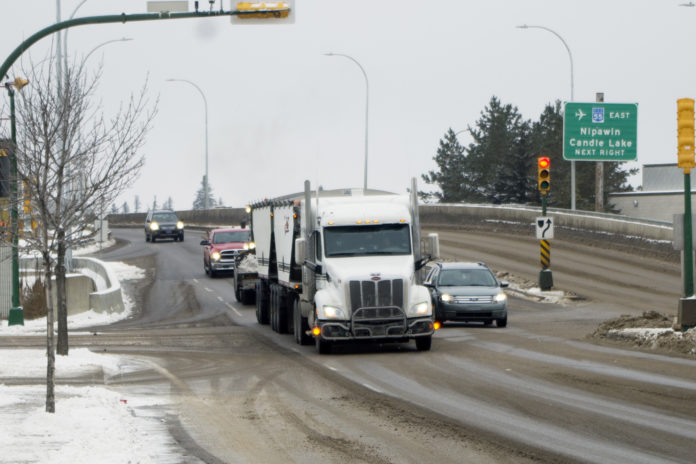
Prospective semi drivers will face a mandatory minimum of 121.5 hours of training before receiving their Class 1 commercial licenses according to new regulations unveiled by the provincial government on Monday.
The new regulations come into effect on March 15, 2019 and will impact all drivers trying to get their licence in Saskatchewan. Current drivers will be grandfathered into the new system, while new drivers who get their licence before March 15 will be subject to a 12-month safety monitoring program.
Prince Albert Carlton MLA Joe Hargrave, the Minister Responsible for SGI, said the government wanted truck drivers to have as much experience as possible before hitting the open road.
“We wanted more hours in the truck. That’s the key,” Hargrave said. “We’re trying to get (drivers) behind the wheel, even if it’s just working it around the yard.”
The provincial government consulted a number of other provinces before making the final decision. This program is based on a similar one in Ontario, which requires drivers to have at least 103 hours of training before they get their licence.
Hargrave said 121.5 hours is a reasonable time for drivers to process through all the different segments of the training process, which will now resemble the graduated licence program used for Class 5 licenses. The new curriculum will include classroom instruction and behind-the-wheel training, with a focus on basic driving techniques, professional driving habits, vehicle inspections and air brakes. SGI examiners will be the only trainers allowed to grade road tests.
“The first 12 months are always the trickiest whenever you’re learning to drive a semi or a regular car,” Hargrave said. “We have a graduated licence program right now for your car, so why not have it for semis as well?”
More changes could be on the way, especially in the agriculture sector, where semi drivers travel less frequently, over shorter distances, and through less rural areas without large traffic counts.
Once the new regulations come into effect, drivers using a semi as part of a farming operation will need an “F” endorsement on their existing driver’s licence. They will also be restricted from operating semis outside the province. “F” endorsements are not required for farmers or agriculture workers who already process a Class 1 licence, or once they take the mandatory training.
Farm operations was one of the areas provincial NDP leader Ryan Meili wanted to see more focus on. Meili told media the it was important to have mandatory training in place, but disagreed with what they implemented in the agriculture sector.
“It was good to see that (mandatory training) for all new long-haul drivers, but there are a couple of holes still left in this,” he said.
Meili also wants more stringent checks and balances on current drivers to make sure their skills don’t deteriorate. He said it’s normal in areas like medicine for doctors and paramedics to receive regular updated training, and he wants that to happen with semi drivers too.
Saskatchewan Trucking Association approves of new regulations
The Saskatchewan Trucking Association (STA) gave their full endorsement to the new regulations on Monday. STA executive director Susan Ewart said in a media release that the industry had a responsibility to make sure drivers had the knowledge and skills to do their job, and applauded the provincial government for their efforts.
Closer to home, Prince Albert semi drivers like Jeff Thoms, who owns and operates his own trucking business, said it’s a good idea to focus on increased training, although he added that there’s no substitute for experience.
“You can’t train everything,” explained Thoms, who’s been driving semis since 1985. “Experiencing stuff on the road itself, with time, makes a better (driver).”
The new regulations won’t affect him too much since he only hires semi drivers with at least two years of experience or more than 150,000 km on the road, among other requirements. Because many of his loads are oversized and require special government permits, it’s illegal for him to hire rookie drivers at the start of their careers.
Still, he thinks the focus on training is a positive development, especially since things were much more lax when he passed his Class 1 licence test back in the ’80s.

